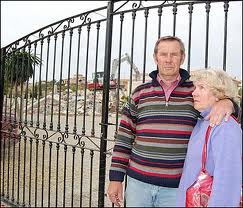Last week, the Sunday Times reported that Brits were rushing to buy cheap properties around the Mediterranean to take advantage of plummeting property prices in Club Med countries. But is it really such a great idea to buy in a bankrupt Club Med country?
You’ve probably seen stories about Brits buying houses in corrupt, bankrupt Spain which are then demolished by the authorities as the properties were built by developers bribing local planners without proper planning permission.
Well our bankrupt Spanish friends have found 2 new ways to take money from foreigners owning properties there.
1. People who have holiday homes is Spain will have to pay an “enjoyment tax” based on the rentable value of their property even if it is not rented out. This “enjoyment tax” will supposedly be used to maintain roads and airports.
2. If you’re an expat (Brit, German, Dutch or whatever) living full-time in Spain, according to Spain’s new reporting requirements all residents have to declare assets abroad worth €50,000 or more and will be taxed on these assets. Relatively few Spaniards have assets outside of Spain. But hundreds of thousands of retired European expats living in Spain have properties, bank accounts, trusts, and pension funds back at home. This law hits them harder than anyone else. Some experts suggest it was designed to do so, whilst others argue it might be an unintended consequence
And here’s a lovely story from corrupt, bankrupt, paedophile paradise Portugal about how the government is planning to absolutely screw anyone with a home near the sea or a river. Many such homes will be owned by foreigners.
Owners of property in waterfront locations considered as “hydric land” in the public domain have until January 1, 2014 to prove in court that their land has been in private hands for at least 150 years or face seeing it integrated into state property.
The controversial ruling, under Law nº54/2005 of November 15, which is being widely contested by several political groups for being “unconstitutional” and “inaccessible” to the vast majority of people, obliges owners of property within “Domínio Público Hídrico” areas, including all properties on land located within 50 metres from the sea or clifftop edge and within 30 metres in the case of a riverbank, to seek recognition in court of its private ownership for at least a century-and-a-half or the land will be subject to public domain treatment, including use and occupation licences and taxes.
The vast majority of people have no knowledge of the ancient law that dates back to 1864 and several political groups have contested the complexity of the process for property owners to legalise their situation within the short timeframe, the bureaucratic and legal costs involved and the mandatory hiring of a lawyer to present a court case. Property owners affected by the law must move swiftly to ensure they meet the January 1 2014 deadline.
Once designated as public domain land, its occupation by private individuals will be subject to a State-granted authorisation/licence, which has to be paid for and has a validity period, the use of the land will be limited and rates for occupying state property will be charged. Rates are charged according to the size and use of the land, for example a residential house or a golf course, but can potentially be high.
These moves by the bankrupt Spanish and bankrupt Portuguese to milk mainly foreigners, have made many properties in those countries next to worthless. Feel like buying a holiday home or retirement property in bankrupt Spain, Portugal, Greece or Cyprus now?
(So, now I’ve saved you, someone in your family or a friend tens of thousands of pounds, perhaps you’d be so good as to spend just £6 or so of this buying a copy of my latest book GREED UNLIMITED. I only sold one copy last week, which isn’t great)
















Not just foreigners. There are thousands of Portuguese people who own land near rivers and sea and they will have to pay tax. I am one of them. Trying very hard to prove that it was private land for over 150 years, but I think we might get there.
I have a feeling that all this has been blown out of proportion since the “Código Civil” has articles which regulate private property. This so-called new law dates back to 2005 and is not something recently made up, so the article is to say the least inaccurate when it says that the “bankrupt countries like…. have come up with this….”. Perhaps more information should be gathered before writing such articles: a word of advice – lawyers are not alwyas there to help.
Marta Cunha